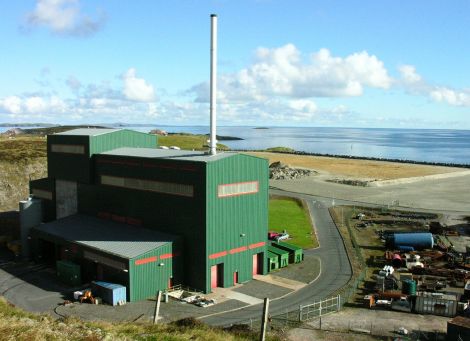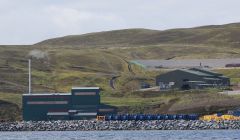Council / New Orkney waste facility would result in less rubbish being sent north for burning
LESS rubbish is likely to be shipped from Orkney to Shetland for burning in the incinerator as a consequence of plans for a new waste management facility in Kirkwall.
Plans have been drawn up for a £17 million facility in Orkney which will include an “in vessel composter” for food waste – as well as sorting equipment for dry recyclables.
For more than 20 years Shetland has imported waste from Orkney to burn in its incinerator alongside local and offshore rubbish.
Through burning waste the energy recovery plant, which is located at Rova Head and is currently being upgraded, helps to provide hot water for homes and businesses in the Lerwick district heating scheme.
On average roughly 8,322 tonnes of waste from Orkney is burned a year, bringing in around £437,000 in income.
But a report which went in front of Orkney councillors on the proposed new Kirkwall facility said: “The cumulative impact of collecting more recycling streams, plus the separation of food waste will result in reduced residual waste tonnages being shipped to Shetland for disposal.”
A recommended option is also to carry out additional pre-treatment work on waste – meaning that Orkney could extract any metals from rubbish before it is shipped.
A meeting of Orkney Islands Council’s development and infrastructure committee heard last week that it costs £190 per tonne to ship waste to Shetland.
With food waste heavy and wet, it makes sense for Orkney to separate this from general rubbish when it comes to costs, the meeting heard.
Shetland Islands Council’s environment and estate operations manager Carl Symons said, however, that more food waste staying in Orkney would not have too much of an impact locally because it is not the best material for burning anyway.
“Reduction in food waste is a common goal we share both here and in Orkney – we’re both looking at viable alternatives to meet legislation and to increase recycling rates,” Symons said.
Become a member of Shetland News
“The impact of this in terms of costs will be negligible, as food waste is not a particularly useful fuel for an incinerator to burn.”
But over the last few years there has already been around a five per cent reduction in the tonnage of Orkney waste incinerated.
“While some of that may be Covid related I also suspect diverting recyclate from waste streams is already having an impact as people’s behaviour changes,” Symons added.
Like Shetland, Orkney’s recycling rate is well below the national target, although locally it has risen in recent years thanks to the introduction of a household recycling scheme.
Symons said both the Shetland and Orkney councils are looking to increase recycling streams, which will also be affected by the national introduction of a deposit return scheme.
In July 2022 people in Scotland will start paying a 20p deposit when they buy a drink in a single-use container, and they will receive it back when they return the empty bottle or can, which will then be recycled.
One hope is that this scheme will result in less litter.
Symons added: “The net effect is that these developments may see some additional waste streams being increased or brought online to meet demand.”
The SIC manager said this – and a forecasted reduction in local authority waste – was taken into account when deciding on the current upgrade of the energy recovery plant.
The work focuses on water cooling systems, is worth nearly £2.9 million, and should improve efficiency and capacity.
Symons said future planning informed the selection of water cooled wear zones for the energy recovery plant upgrade, “as they offer more opportunities to take a broader spectrum of waste streams”.
“So in essence we will need to diversify where we obtain waste but that shouldn’t have any negative financial impact on the council,” he said.
“Indeed, we hope the actual outcome is positive on both capacity and efficiency but we’ll need to evaluate the performance of the system once it’s commissioned.”
Become a member of Shetland News
Shetland News is asking its many readers to consider paying for membership to get additional features and services: -
- Remove non-local ads;
- Bookmark posts to read later;
- Exclusive curated weekly newsletter;
- Hide membership messages;
- Comments open for discussion.
If you appreciate what we do and feel strongly about impartial local journalism, then please become a member of Shetland News by either making a single payment, or setting up a monthly, quarterly or yearly subscription.























































































